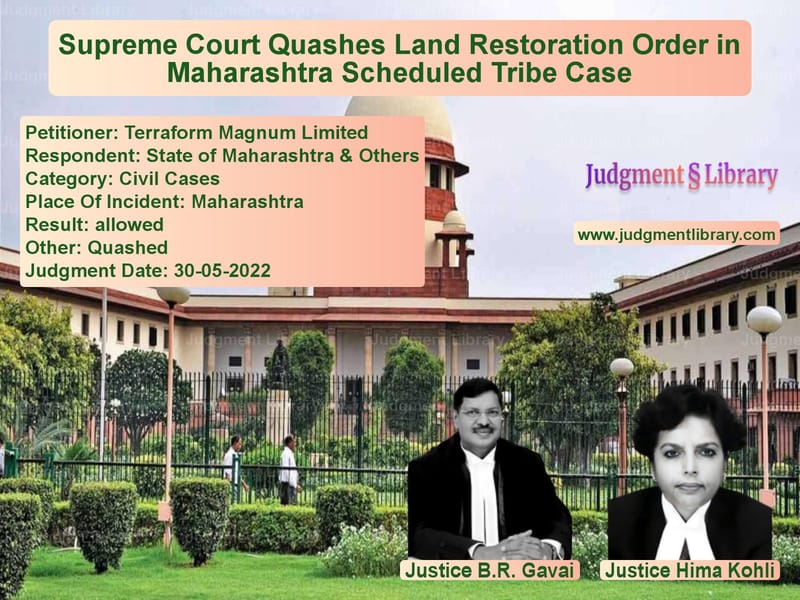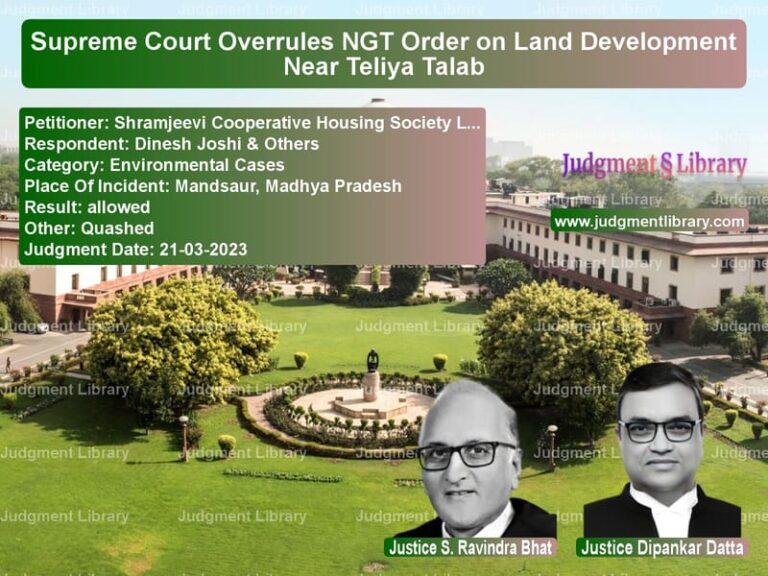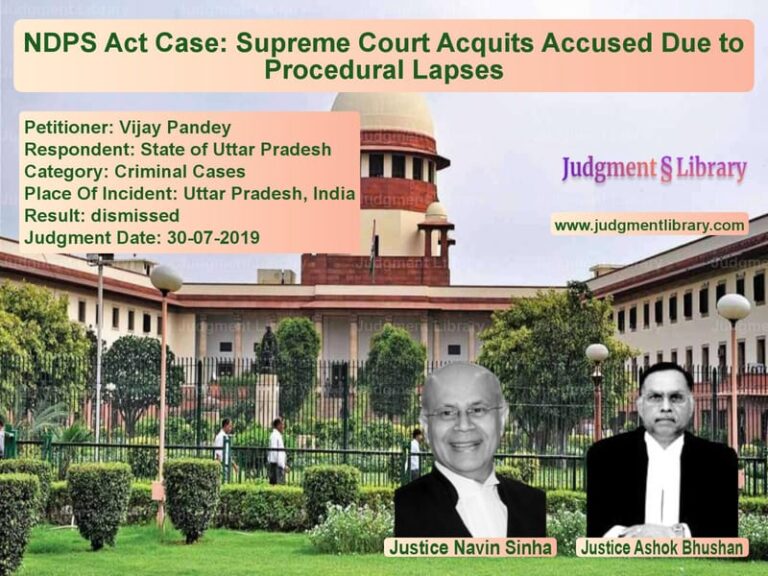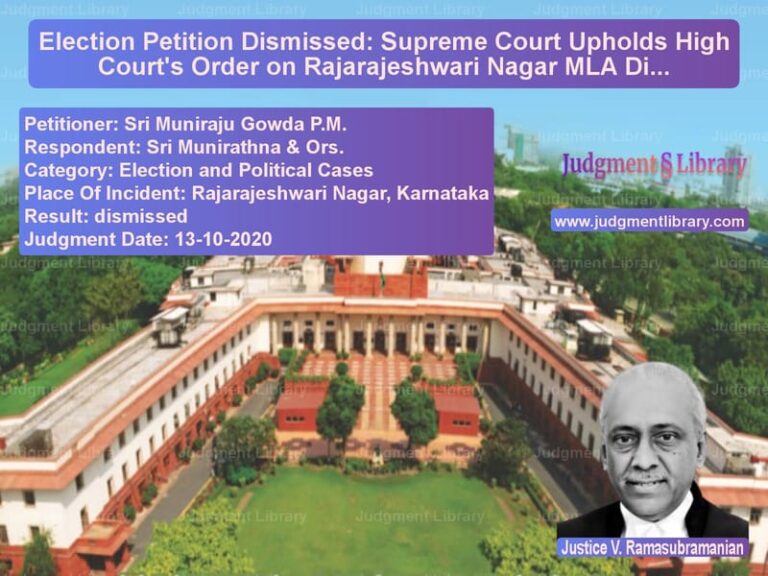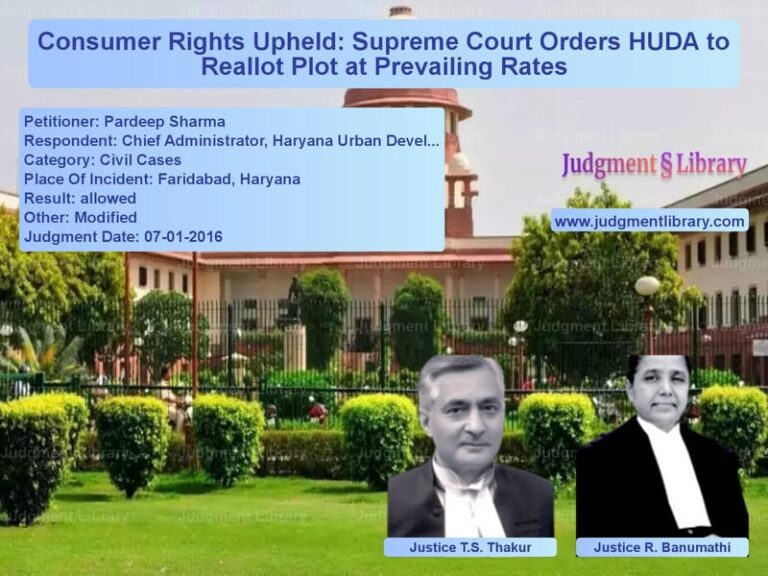Supreme Court Quashes Land Restoration Order in Maharashtra Scheduled Tribe Case
The Supreme Court of India, in the case of Terraform Magnum Limited v. State of Maharashtra & Others, delivered a significant ruling on May 30, 2022, quashing the Maharashtra government’s order to restore land under the Maharashtra Restoration of Lands to Scheduled Tribes Act, 1974. The judgment highlighted the importance of verifying Scheduled Tribe status before granting benefits under protective legislation.
Background of the Case
The case involved a land dispute concerning property originally owned by one Hira Komb. Over time, the land changed hands and was eventually acquired by Terraform Magnum Limited, formerly known as Everest Buildcon Limited.
Read also: https://judgmentlibrary.com/land-compensation-dispute-supreme-court-ruling-on-haryana-acquisitions/
With the enactment of the Maharashtra Restoration of Lands to Scheduled Tribes Act, 1974, an application was filed for the restoration of this land to the legal heirs of Hira Komb. The Maharashtra government, through an order dated April 18, 2016, directed the restoration of the land to the descendants of Hira Komb. This order was challenged before the Bombay High Court, which upheld the government’s decision on December 15, 2016.
The appellant, Terraform Magnum Limited, then approached the Supreme Court, arguing that the basis for the restoration order— the Scheduled Tribe status of one of the claimants— had been invalidated.
Key Legal Issues
- Whether the Maharashtra government’s order for land restoration was valid after the Caste Scrutiny Committee invalidated the Scheduled Tribe certificate of the claimant.
- Whether benefits under the Maharashtra Restoration of Lands to Scheduled Tribes Act, 1974, could be extended to individuals who were not officially recognized as belonging to a Scheduled Tribe.
- The legal impact of caste verification on government decisions regarding land restoration.
Arguments by Terraform Magnum Limited
The appellant, Terraform Magnum Limited, represented by Senior Advocate Vinay Navare, made the following arguments:
- The entire case for land restoration was based on the claim that the heirs of Hira Komb belonged to a Scheduled Tribe.
- The Caste Scrutiny Committee, in an order dated February 24, 2020, had invalidated the Scheduled Tribe certificate of respondent No. 9, Dinesh Kishan Komb.
- Since the very foundation of the claim had been nullified, the government’s order was legally unsustainable.
- None of the other legal heirs of Hira Komb had a Scheduled Tribe certificate, further weakening their claim for restoration.
Arguments by the State of Maharashtra
The State of Maharashtra, represented by Advocate Sachin Patil, countered with the following points:
- The Maharashtra Restoration of Lands to Scheduled Tribes Act, 1974, is a beneficial legislation intended to protect land rights of tribals.
- The invalidation of one heir’s Scheduled Tribe certificate should not automatically disqualify all legal heirs from claiming benefits under the Act.
- The government’s objective was to restore land to the rightful owners, and the Court should adopt a broader interpretation to ensure justice.
Supreme Court’s Observations
The Supreme Court analyzed the validity of the restoration order in light of the caste verification process. It noted:
“The Maharashtra Restoration of Lands to Scheduled Tribes Act, 1974, is indeed a beneficial legislation, but it applies only to those who are legally recognized as members of a Scheduled Tribe.”
Referring to the caste verification mechanism established under the Maharashtra Scheduled Castes, Scheduled Tribes, De-Notified Tribes (Vimukta Jatis), Nomadic Tribes, Other Backward Classes, and Special Backward Category (Regulation of Issuance and Verification of) Caste Certificate Act, 2000, the Court emphasized:
“Unless the claim of an individual is validated by the Caste Scrutiny Committee, they cannot be treated as belonging to a Scheduled Tribe.”
The Court found that only respondent No. 9, Dinesh Kishan Komb, had a Scheduled Tribe certificate, and this certificate had been invalidated by the Caste Scrutiny Committee. None of the other legal heirs had been certified as belonging to a Scheduled Tribe. As a result, the very foundation of the land restoration claim had collapsed.
Final Judgment
The Supreme Court allowed the appeal and quashed the Maharashtra government’s order, stating:
- The order of the Caste Scrutiny Committee invalidating the Scheduled Tribe certificate of Dinesh Kishan Komb was placed on record.
- The appeal was allowed, and the High Court’s order dated December 15, 2016, as well as the State Government’s order dated April 18, 2016, were set aside.
- The respondents had failed to establish their Scheduled Tribe status, making them ineligible for land restoration under the Act.
Key Takeaways from the Judgment
- The ruling establishes that land restoration under the Maharashtra Restoration of Lands to Scheduled Tribes Act, 1974, is strictly contingent upon verified Scheduled Tribe status.
- Caste Scrutiny Committee decisions hold binding legal weight in determining eligibility for benefits under protective legislation.
- The judgment prevents misuse of welfare legislation by ensuring that only genuine members of Scheduled Tribes receive statutory protections.
- The case underscores the importance of legal due diligence in land acquisition and government decision-making.
Conclusion
The Supreme Court’s decision in Terraform Magnum Limited v. State of Maharashtra sets a crucial precedent in land restoration disputes involving Scheduled Tribe claims. By affirming that caste verification is a fundamental prerequisite for claiming benefits under protective laws, the judgment ensures that land rights are safeguarded for rightful tribal beneficiaries.
This ruling reinforces the legal framework governing caste verification and provides clarity on the implementation of protective land laws, ensuring that they serve their intended purpose without being misused.
Petitioner Name: Terraform Magnum Limited.Respondent Name: State of Maharashtra & Others.Judgment By: Justice B.R. Gavai, Justice Hima Kohli.Place Of Incident: Maharashtra.Judgment Date: 30-05-2022.
Don’t miss out on the full details! Download the complete judgment in PDF format below and gain valuable insights instantly!
Download Judgment: terraform-magnum-lim-vs-state-of-maharashtra-supreme-court-of-india-judgment-dated-30-05-2022.pdf
Directly Download Judgment: Directly download this Judgment
See all petitions in Property Disputes
See all petitions in Landlord-Tenant Disputes
See all petitions in Specific Performance
See all petitions in Judgment by B R Gavai
See all petitions in Judgment by Hima Kohli
See all petitions in allowed
See all petitions in Quashed
See all petitions in supreme court of India judgments May 2022
See all petitions in 2022 judgments
See all posts in Civil Cases Category
See all allowed petitions in Civil Cases Category
See all Dismissed petitions in Civil Cases Category
See all partially allowed petitions in Civil Cases Category

